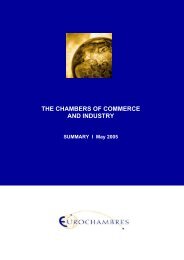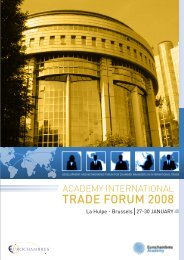Eurochambers Academy June 2000 - Eurochambres Academy
Eurochambers Academy June 2000 - Eurochambres Academy
Eurochambers Academy June 2000 - Eurochambres Academy
- No tags were found...
You also want an ePaper? Increase the reach of your titles
YUMPU automatically turns print PDFs into web optimized ePapers that Google loves.
<strong>Eurochambers</strong> <strong>Academy</strong>July 2001the external environmentfacing Chambers
“well gentlemen, we don’t knowwhere we’re going but we’regoing there fast”John Quincey Adams
external environment• demography• employment• social• north/south• environment• e-business• organisations• work• government• issues for Chambers
demography• ageing population• more carers
ageing population (EU)
ageing population (UK)• expectancy +30 years in 20 th century(75 years men, 80 years women)• 1901 : 1 in 20 > 65 years old1988 : 1 in 6 > 65 years old
telegrams from the Queen• 300 centenarians in 1951• 5,500 in 1996• 40,000 by 2036
more carers (UK)• one in eight people in Britain is now a carer- about 7m people• 15% of the workforce are carers• sandwich generation
employment• participation of women• flexible working• work/life balance
participation of women (UK)• proportion of women aged 25 – 34 at work– 1971 45%– 1998 71%
participation of women (USA)• 75% of new business starts are by women• women now own 38% of all companies• women employ more than the Fortune 500combined
“Life is too short to stuff a mushroom”Shirley Conran“I’ve been on calendars but never ontime”Marilyn Monroe
flexible working (UK)• 23% of all employees (24% female, 15% male)work by- flexi-time- annualised hours- shorter week or fortnight- term-time working- job share
flexible working (UK)• >1.5m corporate employees work from home• 10% of UK workers will be teleworking by 2004
work/life balance• multiple careers• portfolios•Third Age• lifelong learning• retirement and pensions
“Before very long the full-time worker willbe a minority of the working population.Our assumptions about how the world works,how taxes are collected, families supported,lives planned and corporations organizedwill have to change radically.”Charles Handy ‘The Age of Unreason’ 1989
social• structural unemployment• haves and have-nots• crime and disorder
haves and have-nots (UK)• London is the richest region in Europe, with222% of average wealth• 5 of the 10 most deprived areas in Englandare in London• City bonuses total £1bn (Є1.7bn) – 40% ofCity fringe residents are on social security
north and south
north and south• 7 million people have net worth of > $1 million. Theirwealth (£16 trillion) is ×18 Britain’s GDP and is likely toreach £28 trillion in four years (source: Merrill Lynch)• number of people in absolute poverty– 1980 700 million– 1990 1.2 billion (one in five living on < $1 a day)• universal access to basic social services would cost $40bna year – about what people in the developed world spendon cigarettes (source: UN Secretary General)
environment• population growth• urbanisation•waste• global warming• bio-diversity• sustainable technology
population growth (world)• 1900 1.6bn1950 2.5bn<strong>2000</strong> 6.0bn• growth from 5bn to 6bn tookjust 12 years• half of the world’s population is< 25 years old
“When the 20th century began14% of us lived in cities. Whenit ended, a majority of us lived incities. We have become an urbanspecies”after Lester Brown, President, World WatchInstitute
urbanisation• New York was the first mega-city(>10m people)Today there are 20 mega-cities• 19 of the largest 25 cities are in developing countries• Mexico City is now the largest city. From 1900 to 1990it grew from 344,000 to 20m people• New York took 150 years to reach a population of 8m.Mexico City took 15 years to increase its population by8m
waste• every year 4.8 trillion aluminiumcans are not recycled in UK, enoughto go round the world 7 times• average life span of a Tokyobuilding is just over 5 years
global warming• average global surface temperature has risen1°F during the last 100 years• the hottest 12 years ever recorded are allsince 1980• sea levels have risen 15cm in the last 100years• one-third of world population lives within65km of the sea
global warming•CO 2 emissions have gone up by 25%in the last 100 years• 1m square km of forest absorbs 1bntonnes of CO 2 per year• tropical deforestation runs at 17mhectares every year (about the size ofthe British Isles)
io-diversity• 51% of freshwater species are declining in number(WorldWide Fund for Nature)• on average one bird species has died out everycentury. At present 185 species face a 50%chance of extinction in the next 10 years (BirdlifeInternational)• ¼ of all mammals are in grave danger (UK GovernmentChief Scientist)• between 1/3 and 2/3 of all plant and animalspecies will be lost in the second half of thiscentury
unsustainable technology• motor vehicles account for 15% of theworld’s CO 2 output (500m tonnes of carbonin 1988)• in 1992 there were 600m motor vehicles inuse worldwide• one-third of land in cities is used by cars
“Spend the night in bed and when youwake up the next morning 30,000 newcars will have been made while youwere asleep. Worldwide more thanone new car is produced every second”‘Mad Car Disease’ Greenpeace, UK
e-commerce• global b2c e-commerce spend willgrow from $24bn in 1999 to $660bnin 2005 (Reuters Business Insight)• by 2015 50% of all retailing will beelectronic (IBM estimate)
e-commerce• this year EU internet users will outnumberUS users• by 2004 the value of EU e-commerce willbe 89% of US, up from 13% in 1998• UK consumer online spend greatest intravel, PCs and groceries but modal shiftgreatest in software (44% by 2005)
e-market dynamics• choice• pressure on price• consumer promiscuity• value of brands• partnering• fast transactions
digital export• streamlined processing• end of clerical jobs• less need for intermediaries
dot com• low barriers to entry• high rewards• no geographical boundary• immature market• clicks and mortar
fuzzy organisations• dispersed physically• un-hierarchical• people-dependent
new ways of work• mobile• data rich• technology-vulnerable• 24/7
mobility• where I connect my laptop is myoffice
mobility• by 2005 there will be 1bn mobile phones• within three years 50% of all mobile phoneswill be internet-enabled• within four years there will be 700m usersof m-commerce world wide
mobility• UK auction for 5 licenses for 3 rd generationwireless services raised ×7 government’sestimate (£22.5bn, Є37.5bn)• the number of mobile phone users in Britainalmost doubled (13m to 24m) from Summer1999 to Summer <strong>2000</strong>
data rich• data on the internet doubles every 100 days
technology-vulnerable• cost of Melissa virus in 1999 - $80m• cost of Love Bug virus in May <strong>2000</strong> - $7bn
24/7• global competition forces maximumutilisation of plant• services demanded round the clock• the sleeping continent
24/7 (UK)• 17m people shop at night(source: Shell UK)• 25% of shoppers do their maingrocery shop in evening• work time and private time aremixed• Waterside
government• demand for transnationalregulation• decline of the nation state• European tribalism
public and private power– in 1995 Royal Dutch Shell decided to avoid UKNational Insurance contributions for Britishsailors by transferring their contracts toSingapore and administering them from the Isleof Man
new hybrids (UK)public finance initiativepublic private partnership– prisons– airports– light rail– primary schools– forensic science–waterways– street lighting
issues for Chambers• as organisations and employers• as representative bodies• as service providers
Chambers as organisations• membership• geography• governance• male domination• employment issues
Chambers as representative bodies• independence from Government• methods of consultation• engaging new era businesses• future agenda
Chambers as service providers• changing needs of 21 st centurybusiness• new competitors• new channels to market
caution“change is not what it used to be”Charles Handy
“I feel a little better now”Last words of UK Prime Minister Gladstone
















